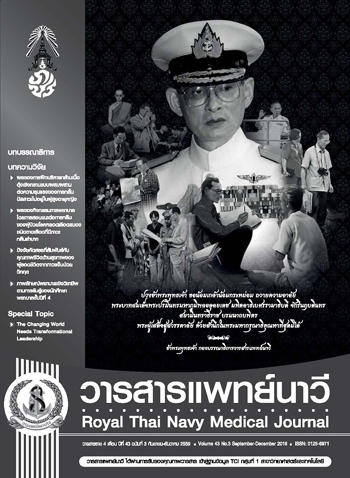ปัจจัยคัดสรรที่สัมพันธ์กับคุณภาพชีวิตด้านสุขภาพของผู้รอดชีวิตจากภาวะเจ็บป่วยวิกฤต
Main Article Content
Abstract
The purposes of this correlational research were to investigate health-related quality
of life in critical illness survivors and to determine factors associated with health-related
quality of life including functional status, fatigue, sleep quality and sense of coherence. The
theoretical framework was based on Health-Related Quality of Life Conceptual Model of
Wilson and Cleary. One hundred and twenty-seven adult critical illness survivors were
recruited using a multi-stage sampling technique from Lerdsin Hospital, Police General
Hospital and Somdech Phra Pinklao Hospital. Research instruments composed of demographic
data form, Karnofsky Performance Status Scale, Revised Piper Fatigue Scale, The
Pittsburgh Sleep Quality Index, The Sense of Coherence Questionnaire, and EQ-5D. The
reliabilities of the instruments composed of Revised Piper Fatigue Scale, The Pittsburgh
Sleep Quality Index, The Sense of Coherence Questionnaire, and EQ-5D were .94, .79, .80,
and .89. Data were analyzed using descriptive statistics and Pearson’s product moment
correlation coefficients.
The results showed that
1. Mean score of health-related quality of life in critical illness survivors was at a good
level ( = .738, SD = .28).
2. Functional status, and sense of coherence were significant positively related to
health-related quality of life in critical illness survivors at the .01 statistically significant level
(r = .773, .570, respectively).
3. Fatigue, and poor sleep quality was significant negatively related to health-related
quality of life in critical illness survivors at the .01 statistically significant level (r = -.723,
-.441, respectively).
Article Details

This work is licensed under a Creative Commons Attribution-NonCommercial-NoDerivatives 4.0 International License.
References
2. Orwelius L, Fredrikson M, Kristenson M, Walther S, Sjöberg F. Health-related quality of life scores after intensive care are almost equal to those of the normal population: a multicenter observational study. Crit Care 2013;17(5):R236.
3. Griffiths R, Hall JB. Intensive care unit-acquired weakness. Crit Care Med 2010;38(3):779-87.
4. Eddleston JM, White P, Guthrie E. Survival, morbidity, and quality of life after discharge from intensive care. Crit Care Med 2000;28(7):2293-9.
5. McKinley S, Fien M, Elliott R, Elliott D. Health-related quality of life and Associatedfactors in Intensive Care Unit Survivors 6 months after discharge. Am J Crit Care 2016;25(1):52-8.
6. Choi J, Tate JA, Hoffman LA, Schulz R, Ren D, Donahoe MP, et al. Fatigue in FamilyCaregivers of Adult Intensive Care Unit Survivors. J Pain Symptom Manage 2014;48(3):353-63.
7. Griffiths J, Hatch RA, Bishop J, Morgan K, Jenkinson C, Cuthbertson BH, el al. An exploration of social and economic outcome and associated health-related quality of life after critical illness in general intensive care unit survivors: A 12-month follow-up study. Crit Care 2013;17(3):R100.
8. Wilson IB, Cleary PD. Linking clinical variables with health-related quality of life-aconceptual model of patient outcomes. JAMA 1995;273(1):59-65.
9. Rattray JE. Life after critical illness: an overview. Journal of Clinical Nursing 2013;23:623-33.
10. Matthews EE. Sleep Disturbances and Fatigue in Critically Ill Patients. AACN AdvCrit Care 2011;22(3):204-24.
11. Vest MT, Murphy TE, Araujo KL, Pisani MA. Disability in activities of daily living, depression, and quality of life among older medical ICU survivors: a prospective cohort study. Health Qual Life Outcomes 2011;9:1-9.
12. Fok SK, Chair SY, Lopez V. Sense of coherence, coping and quality of life following a critical illness. J Adv Nurs. 2005;49(2):173-81.
13. Thorndike RM. Correlation procedures for research. New York: Gardner Press; 1978.
14. อำนวยพร อาษานอก. ปัจจัยคัดสรรที่มีความสัมพันธ์กับคุณภาพชีวิตของผู้ป่วยวัยผู้ใหญ่โรคเนื้องอกสมอง. [วิทยานิพนธ์พยาบาลศาสตรมหาบัณฑิต สาขาวิชาการพยาบาลผู้ใหญ่]. จุฬาลงกรณ์มหาวิทยาลัย; 2549.
15. อมรรัตน์ กรเกษม. ประสบการณ์อาการเหนื่อยล้า กลวิธีการจัดการอาการ และภาวะการทำหน้าที่ในผู้ป่วยหัวใจล้มเหลว. [วิทยานิพนธ์พยาบาลศาสตรมหาบัณฑิต สาขาวิชาการพยาบาลผู้ใหญ่]. มหาวิทยาลัยมหิดล; 2556.
16. ตะวันชัย จิรประมุขพิทักษ์, วรัญ ตันชัยสวัสดิ์. คุณภาพการนอนหลับของพยาบาลประจำการโรงพยาบาลสงขลานครินทร์. วารสารสมาคมจิตแพทย์แห่งประเทศไทย 2540;42(3):123-31.
17. สมจิต หนุเจริญกุล, ประคอง อินทรสมบัติ, พรรณวดี พุธวัฒนะ. สิ่งรบกวนในชีวิตประจำวันความเข้มแข็งในการมองโลก และการรับรู้ถึงความผาสุกในชีวิตของอาจารย์พยาบาลในมหาวิทยาลัย. วารสารพยาบาล 2532;38(3):169-90.
18. จันทนา พัฒนเภสัช, มนทรัตน์ ถาวรเจริญทรัพย์, ศิรินาถ ตงศิริ, ลี่ลี อิงศรีสว่าง, วันทนีย์ กุลเพ็ง,ปฤษฐพร กิ่งแก้ว และคณะ. เครื่องมือประเมินคุณภาพชีวิต EQ-5D-5L: การทดสอบคุณสมบัติการวัดและค่าน้ำหนักอรรถประโยชน์ในประชากรไทย. โครงการประเมินเทคโนโลยีและนโยบายด้านสุขภาพ. [อินเทอร์เน็ต]. [เข้าถึงเมื่อ 15 มกราคม 2559]. แหล่งที่มา: https://www.hitap.net/research/17587.
19. Sakthong P, Sonsa-Ardjit N, Sukarnjanaset P, Munpan W. Psychometric properties of the EQ-5D-5L in Thai patients with chronic diseases. Qual Life Res 2015;24(12):3015-22.
20. วิจิตรา กุสุมภ์ และคณะ. การพยาบาลผู้ป่วยภาวะวิกฤตแบบองค์รวม. พิมพ์ครั้งที่ 5. กรุงเทพมหานคร: สหประชาพาณิชย์; 2556.
21. Bailey P, Miller R, Clemmer T. Culture of early mobility in mechanically ventilated patients. Critical Care Medicine 2009;37:S429-35.
22. Alasad JA, Tabar NA, Ahmad MM. Patients’ experience of being in intensive care units. Journal of Critical Care 2015;30:859.e7-11.
23. Kaarlola A, Pettila V, Kekki P. Quality of life six years after intensive care. Intensive Care Med 2003;29:1294-9.
24. Myhren H, Ekeberg O, Stokland O. Health-related quality of life and return to work after critical illness in general intensive care unit patients: A 1-year follow-up study. Crit Care Med 2010;38(7):1554-61.
25. Dowdy DW, Eid MP, Sedrakyan A, Mendez-Tellez PA, Pronovost PJ, Herridge MS, et al. Quality of life in adult survivors of critical illness: a systematic review of the literature. Intensive Care Med 2005;31(5):611-20.
26. Chaboyer W, Elliott D. Health-related quality of life of ICU survivors: review of the literature. Intensive Crit Care Nurs 2000;16(2):88-97
27. Jackson JC, Pandharipande PP, Girard TD, Brummel NE, Thompson JL, Pun BT, et al. Depression, post-traumatic stress disorder, and functional disability in survivors of critical illness in the BRAIN-ICU study: a longitudinal cohort study. Lancet Respir Med 2014;2(5):369-79.
28. Haas JS, Teixeira C, Cabral CR, Fleig AH, Freitas AP, Treptow EC, et al. Factors influencing physical functional status in intensive care unit survivors two years after discharge. BMC Anesthesiol 2013;13(11):1-9.
29. Kelly MA, McKinley S. Patients’ recovery after critical illness at early follow-up. J Clin Nurs 2010;19(5-6):691-700.
30. Orwelius L, Nordlund A, Nordlund P, Gustafsson UE, Sjoberg F. Prevalence of sleep disturbances and long-term reduced health-related quality of life after critical care: a prospective multi center cohort study. Crit Care 2008;12(4):R97.
31. Engström Å, Rogmalm K, Marklund L, Wälivaara BM. Follow-up visit in an ICU: receiving a sense of coherence. Nurs Crit Care 2015 Feb 18. doi:10.1111/nicc.12168.


